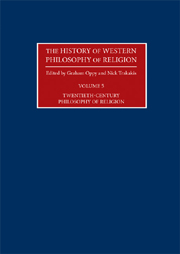Book contents
- Frontmatter
- Contents
- Editorial Introduction
- Contributors
- 1 Twentieth-Century Philosophy of Religion: An Introduction
- 2 William James
- 3 Henri Bergson
- 4 John Dewey
- 5 Alfred North Whitehead and Charles Hartshorne
- 6 Bertrand Russell
- 7 Max Scheler
- 8 Martin Buber
- 9 Jacques Maritain
- 10 Karl Jaspers
- 11 Paul Tillich
- 12 Karl Barth
- 13 Ludwig Wittgenstein
- 14 Martin Heidegger
- 15 Emmanuel Levinas
- 16 Simone Weil
- 17 A. J. Ayer
- 18 William P. Alston
- 19 John Hick
- 20 Mary Daly
- 21 Jacques Derrida
- 22 Alvin Plantinga
- 23 Richard Swinburne
- 24 Late-Twentieth-Century Atheism
- Chronology
- Bibliography
- Index
5 - Alfred North Whitehead and Charles Hartshorne
- Frontmatter
- Contents
- Editorial Introduction
- Contributors
- 1 Twentieth-Century Philosophy of Religion: An Introduction
- 2 William James
- 3 Henri Bergson
- 4 John Dewey
- 5 Alfred North Whitehead and Charles Hartshorne
- 6 Bertrand Russell
- 7 Max Scheler
- 8 Martin Buber
- 9 Jacques Maritain
- 10 Karl Jaspers
- 11 Paul Tillich
- 12 Karl Barth
- 13 Ludwig Wittgenstein
- 14 Martin Heidegger
- 15 Emmanuel Levinas
- 16 Simone Weil
- 17 A. J. Ayer
- 18 William P. Alston
- 19 John Hick
- 20 Mary Daly
- 21 Jacques Derrida
- 22 Alvin Plantinga
- 23 Richard Swinburne
- 24 Late-Twentieth-Century Atheism
- Chronology
- Bibliography
- Index
Summary
Alfred North Whitehead (1861–1947) was an English mathematician and philosopher. He graduated from Trinity College, Cambridge, in 1884, and was a lecturer in mathematics there until 1911. At the University of London he was a lecturer in applied mathematics and mechanics (1911–14) and professor of mathematics (1914–24). From 1924 onwards, he was Professor of Philosophy at Harvard. Whitehead's distinction rests on his contributions to mathematics and logic, the philosophy of science and the study of metaphysics. In the field of mathematics, Whitehead extended the range of algebraic procedures and, in collaboration with Bertrand Russell, wrote Principia Mathematica (3 vols, 1910–13), a landmark in the study of logic. His enquiries into the structure of science provided the background for his metaphysical writings. He criticized traditional categories of philosophy for their failure to convey the essential interrelation of matter, space and time. For this reason he invented a special vocabulary to communicate his concept of reality, which he called the philosophy of organism. He formulated a system of ultimate and universal ideas and justified them by their fruitful interpretation of observable experience. His philosophic construction as applied to religion offered a concept of God as interdependent with the world and developing with it; he rejected the notion of a perfect and omnipotent God. In 1945 he received the Order of Merit.
Charles Hartshorne (1897–2000) was born in Kittanning, Pennsylvania. He entered Haverford College in 1915, but completed his college work at Harvard and took his PhD in philosophy there.
- Type
- Chapter
- Information
- The History of Western Philosophy of Religion , pp. 53 - 68Publisher: Acumen PublishingPrint publication year: 2009



